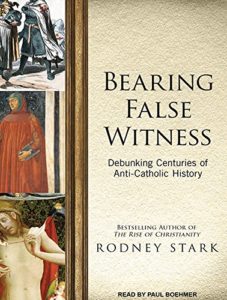
A Review of Bearing False Witness -Debunking Centuries of Anti-Catholic History by Rodney Stark – Templeton Press, 2016.
If you are known to be an observant Catholic, then you have had this conversation. Some question of doctrine comes up – abortion, same-sex “marriage,” divorce and remarriage, or what have you. We explain the Church’s position. A discussion ensues. We begin to make some headway. Our ‘enlightened’ friend, colleague, or acquaintance cuts us off saying, “Of course, the Vatican has its own sins to repent.” Then he/she alludes to some error from the past. We feel ill-equipped. We start looking for a way to escape without looking stupid or being forced to apologize for some long-ago pope. Making it even more uncomfortable, our own educations have led us to believe that our inquisitor may be right.
That situation changes if you have read Bearing False Witness -Debunking Centuries of Anti-Catholic History by Rodney Stark. In this 268-page volume, Professor Rodney Stark takes aim at what many of us “know” or think we know about the history of Catholicism.
Most of us have been exposed to at least some of the ‘black legends’ that Stark discusses. Everyone is familiar with the tales of cruelty associated with the Crusades and Spanish Inquisition. We have all heard about complicity in the slave trade, the persecution of Galileo, and sins against the victims of the Holocaust. This book deftly explains how the “facts” that everybody knows about such matters are grossly inaccurate.
Not a Catholic himself, Stark currently teaches at Baylor University, the largest Baptist university in the world. Notwithstanding, he is clearly sympathetic with the importance of Catholicism in the development of Western civilization and culture.
What Does Saint Thomas Say About Immigration?
Perhaps the most useful part of this book is its organization. Each chapter covers a different error. Stark consistently presents the prevailing opinion before refuting it, as seen in this example, referring to Saint Thomas Aquinas and the Scholastic School of philosophy:
Sir William Dampier (1867-1952) spoke for most conventional academics when he complained that scientific thought was “quite foreign to the prevailing mental outlook” of the Scholastics, who were enmeshed in a “tangle of astrology, alchemy, magic and theosophy” and were absolutely hostile to experimentalism. Not so! The Scholastics were fine scholars who founded Europe’s great universities, and who were the first to formulate and teach the experimental method; it was they who launched the rise of Western science. (page 136)
Stark also employs his own sense of humor to connect the material to current events. “No doubt it was very ‘unenlightened’ of the Crusaders to be typical feudal warriors, but it strikes me as even more unenlightened to anachronistically impose the Geneva convention of the Crusaders while pretending that their Islamic opponents were either UN peacekeepers or hapless victims.” (page 112)
One great feature of the book is that Stark includes information about the scholars who most influenced his thinking on the subjects of each chapter. This is useful for anyone who wants to delve more deeply into that topic.
[like url=https://www.facebook.com/ReturnToOrder.org]
Occasionally, Stark says things that may make traditional Catholics uneasy. This can be seen, for example, in a chapter titled “Church and non-Church magic.” “Non-Church magic” is superstition and witchcraft. “Church magic” refers to pilgrimage sites “where supplicants could seek all sorts of miracles and blessings” and the “extensive array of incantations, prayers, and rites” performed by priests (page 124).
That being said, the book’s virtues far outweigh its shortcomings. This is a great book to have in your library, not just for your own information – but also to lend to that anti-Catholic friend that you were talking to at the beginning of this review. There is much in it that all-knowing friends should know.


